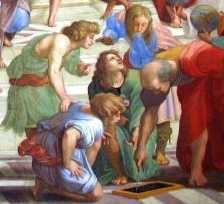Today I return to this hymn in light of what I read in Fr. Lentini's Te Decet Hymnus: The Hymns of the Liturgy of the Hours. There is not a lot of new info on this hymn, but I would like to improve the translation if possible.
mp3
Thou, Christ, art the true light
Lucis largítor spléndide,
Splendid Giver of light
cuius seréno lúmine
by whose serene lamp
post lapsa noctis témpora
after the night time has slipped away
dies refúsus pánditur,
the returning day is spread out
WONDROUS giver of the light!
By whose eternal ray serene,
After the lingering hours of night,
The glory of the morn is seen,
2. Tu verus mundi lúcifer,
Thou true morning star of the world
non is qui parvi síderis
Thou dost not pass like the lesser star (the sun)
ventúræ lucis núntius
though herald of the coming Light
angústo fulget lúmine,
shines scanty light,
Bringer of light indeed art thou;
Not like the common sun of day
That o'er the world is rising now
And shining with a narrow ray;
3. Sed toto sole clárior,
But more brilliant than the sun in all its glory,
lux ipse totus et dies,
Thou art light itself and complete day
intérna nostri péctoris
[brightening] our inmost soul
illúminans præcórdia.
illuminating our heart of hearts
Nay, brighter than the solar beam,
Thyself the sun and perfect light,
And in the breast thy tender gleam
Illumes with glory pure and bright.
4. Evíncat mentis cástitas
Let chastity of the mind overcome
quæ caro cupit árrogans,
those things the flesh desires amiss
sanctúmque puri córporis
a holy and chaste body
delúbrum servet spíritus.
may it keep as a temple of the spirit
Let not our minds be overcome
By false desire or deed of shame,
And be our hearts a shrine and home
Wherein shall burn thy holy flame.
5. Sit, Christe, rex piísime,
tibi Patrique glória
cum Spíritu Paráclito,
in sempitérna saécula. Amen.
In my previous post on this hymn, I said this hymn was written by St. Hilary of Potiers, but Lentini says the author of this 6th century hymn is unknown. These are verses 1, 2, 3, and 7 (plus the doxology) of a longer hymn, the rest of which is sung at the Office of Readings on Friday diurno (when it is celebrated during the day as opposed to at night or very early morning).
Lentini also discloses that he changed the first two lines of verse 4. The original text was
Probrosas mentis castitas
Let the chastity of the mind the shameful
carnis vincat libidines,
lusts of the flesh defeat,
which Lentini says is un po' cruda, "a bit raw." Hmmmm.
Was St. Nicholas the mixed martial arts coach of St. John Chrysostom?
-
Today in the calendar of both the Novus Ordo and the Usus Antiquior it is
the feast of St. John Chrysostom (+407). Benedict XVI wrote a splendid
little Apo...
3 hours ago

No comments:
Post a Comment